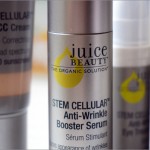
Are organic & natural products useless?
I’m currently stuck in a crossroad when it comes to my skincare regime. While I’m very keen to go all natural and organic, I’m caught up with synthetic form of ingredients not available in natural formulas such as Mexoryl in my new sunscreens and hydroquinone in the recent anti-aging product that I obtained from my dermatologist. On top of that, I was told by my dermatologist that natural and organic skincare products are useless and I’m wasting my money. While I can understand that he said that out of professional interest but that got me thinking hard about the topic. WAS HE RIGHT?
Let me first qualify that my knowledge on natural and organic skincare products is limited and superficial. I developed an interest after reading about their benefits and after seeing what the products did for someone I met. In addition, I was getting disillusioned with the usual skincare products which weren’t yielding the long term benefits I was looking for.
Are all natural or organic skincare products for real?
Frankly, I’m not sticky with having to use strictly organic skincare products. In fact, natural is good enough for me, as they are made from plants and minerals, rather than from synthetic ingredients. Moreover, even though organic products comprise natural ingredients made with the stricter standards, there are no global organic standards as yet and even those which carry the organic certified labels are not 100% organic either. And that’s really the problem. That such products can contain 70% natural or organic ingredients and then 30% synthetic chemicals but still get labelled as natural or organic! Or worst, just 10% natural ingredients and 90% synthetics! Therefore, we need to wise up by learning to read the ingredient list of a product and avoiding some of the harmful ones like those listed below which not only can cause allergies but are considered to be toxic, and in some instances, carcinogenic.
| Diethanolamine (DEA), Triethanolamine (TEA) | Often used in cosmetics as emulsifiers and or foaming agents such as in body wash, shampoo, soap, facial cleanser. |
| Diazolidinyl Urea and Imidazolidinyl Urea | Widely used as preservatives to prevent bacterial growth. Trade names for these chemicals are Germall II and Germall 115. |
| Parabens like Methyl, Propyl, Butyl, Ethyl and Isobutyl | Found in many products and widely used as inhibitors of microbial growth and to extend shelf life of products. |
| Petrolatum | Also known as petroleum jelly and is used for its emollient properties in cosmetics. |
| Propylene Glycol | A synthetic petrochemical derivative that act as solvents, surfactants, and wetting agents. PEG (polyethylene glycol) or PPG (polypropylene glycol) are related. |
| Sodium Lauryl/Laureth Sulfate (SLS) | A harsh detergent used for its cleansing and foam-building properties. Frequently disguised in pseudo-natural cosmetics with the phrase “comes from coconuts.” |
| Synthetic Colors | To beautify the cosmetics and labeled as FD&C or D&C, followed by a color and a number. Example: FD&C Red No. 6 / D&C Green No. 6. |
| Synthetic Fragrances | The synthetic fragrances used in cosmetics can have as many as 200 ingredients but labelled only as “fragrance.” |
Instead of these chemicals, look out for natural alternatives such as plant oils like Jojoba, Avocado, Rosehip or butters like Shea, Cocoa or Jojoba in place of Petrolatum for emollients; Castile Soap, Yucca Extract, Soapwort or Quillaja Bark Extract in place of SLS as natural surfactants; and Tea Tree Essential Oil, Thyme Essential Oil, Grapefruit Seed Extract and D-Alpha Tocopherol Acetate (Vitamin E) in place of Parabens for preservatives.
Are all natural or organic skincare products better?
In addition to believing that natural and organic products are non-toxic, the advocates have stated that such products can support our skin’s natural processes of cell renewal, hydration, oxygenation and protection because they contain a higher concentration of natural actives, and hence a closer affinity to our skin’s own make up. In fact, it is often argued that pure, organic formulas are a great choice for those with sensitive skin as they are less likely to irritate or cause reactions.
Perhaps they’re right but it should be noted that some women have also reported breakouts after using natural or organic products. This is because how the products are being formulated really depends on the the integrity and quality standards of the manufacturer. While natural ingredients may reduce the risk of toxic contaminants, they do not eliminate the possibility entirely especially since as all-natural products tend to degrade more easily.
Are all natural or organic products created equal?
Obviously, the answer is no. Even if the formulation is all natural or organic, the product should contain active ingredients which can benefit our skin. So instead of buying just any natural or organic products, I will now scrutinize the product more thoroughly, looking out for ingredients to address anti-aging, such as these:
| Apha Hydroxy Acids | Natural plant extracts that stimulate collagen synthesis, boost skin elasticity and increase cell renewal. |
| Antioxidants | Vitamins A, C, and E, mineral selenium, and other nutrients that help protect our body from free radicals. |
| Arbutin | A skin de-pigmentation and whitening agent, extracted from the Bearberry plant to inhibit the formation of melanin pigment and prevent aging spots. |
| Co-Enzyme Q10 | Increases cell renewal and also has protective functions and serves as an anti-oxidant against free radicals. |
| Grape seed extract | Contains 95% Polyphenols and 12% tannic acids, also knows as catechines to clam and refine skin surface and make skin less sensitive against environmental influences. |
| Hyaluronic Acid | Stored in the corneous layer of the skin to regulate skin’s water reserves and can hold up to 1,000 times its own weight in water. |
| Rose Hip Oil | Also known as Rosa Mosqueta and is a Triglyceride (vegetable oil) high in polyunsaturated fats and vitamin C to regenerate the skin. |
| White Tea Extract | Contains flavones which have anti-irritating and calming effect and make skin less sensitive to environmental influences. |
(For a comprehensive glossary of natural ingredients, look up Herbal Luxuries.)
Are all natural or organic products useless?
The answer to me is no. Just like the conventional skincare products, not all natural or organic products perform well for sure. But I have seen positive results from using some of these products and I believe there are long term benefits to using them. The trick is to be selective when it comes to choosing the formulations that will work for us.
Well, I hope I will be able to find a range that will work well for me in the long term. For the time being however, I will decide upon natural and synthetic skincare products on a case-by-case basis with the aim to balance between the benefits from active ingredients and potential damage from harmful ingredients.
Comments
Leave a Reply
You must be logged in to post a comment.


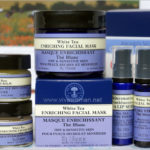

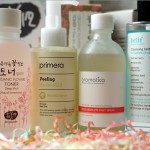











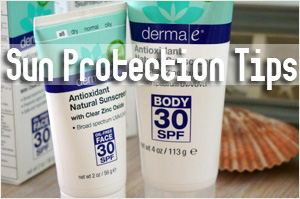
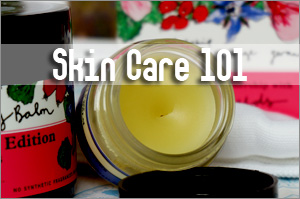
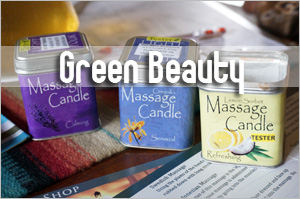
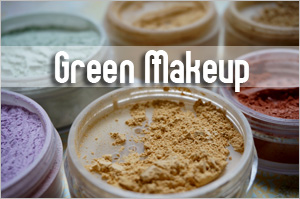
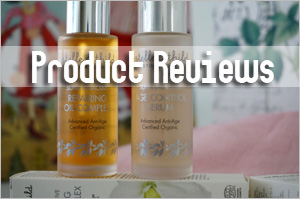

organic products are defitely not useless. both supplement and complement each other. i don’t limit myself to only one or the other.
This is a great read.
I’m constantly weighing the pros & cons when choosing skin care. All my basic care are in natural, but when it comes to Rx (like Retinoids etc), there is only a few choice and they almost all contain parabee. I hated it but I have to use it for its anti-age effects.
Theresa: I think we’re in the same boat. I’m still hoping to come across really effective anti-aging products that are chemical-free.
I have sensitive skin and I would prefer least harmful chemical in the ingredient list. I had read an article stated that truly effective anti-aging ingredients are AHA, retinol and peptides. My skin can’t take AHA and retinol, so I choose peptides with no side effect. For me, an effective ingredient still need other ingredients to produce effective result. One said, the best product is the one that suited your skin. I was still looking for my HG and also puzzled in the crossroad sometimes about ingredient nature.
nicole: That’s right…the HG product. Sometimes I think I find it, but sadly, it doesn’t look to be so after a while…
A good article, but just because something is “natural” or “organic” doesn’t mean it’s any better for you or any less irritating. In face, many natural substances are much worse for you than their synthetic counterparts.
As someone with sensitive, dry, acne prone skin and mild rosacea, I have found that synthetic ingredients are much better for my skin.
the trick to choosing products for your skin is to equip yourself with wider knowledge. i agree that sourcing a good natural, reliable product is not easy. the term ‘organic’ has been heavily abused in the commercial market. one way out is to check for certification logo like USDA organics or ACO (australia certified organic). but not many such products are available. for me, i believe in natural products for the skin. i won’t ingest a spoonful of paraben through my mouth, so why put it on the skin. the skin will absorb anything you put on it – even pollution in the air. you have to remind yourself that skin is a largest organ of the human body. if symptoms are showing up on your skin, probably there is something internally causing the outbreak. i came across Earth Clinic (www.earthclinic.com) and it opened a whole new world to me. its not selling any products, just tons of information to heal yourself – the natural way. i “cured” my acne myself.
Yogo: You know, I’ve been struggling with this for a few months now. I love to test out new skincare products, but now, I find myself getting more and more conscious about the ingredients. The only good thing I see is that more companies are also recognising this and trying to incorporate less harmful ingredients into their range. The L’Occitane Red Rice Range is one example I just came across. Good for them and for us too!
I personally find organic skincare appealing for their ‘natural’ and ‘feel good’ factor. However, I won’t dismiss synthetic ingredients altogether. After all, if you look at clinical situations, most products in medicine are synthetic because they have been used reliably causing minimal side effects. Why is mineral makeup ok and mineral oil not? The latter is just as ‘inert’ as the former! Certain synthetic ingredients cause irritation, of course, just as natural ingredients do. However, in skincare, we tend to believe that natural=good, synthetic=bad. I just wonder if this logic holds up scientifically. Meantime, while I use organic skincare which suits me, I won’t rule out using non-organic products either.
I guess it depends on the person. I have really bad reactions to sodium laureth sulfate, synthetic detergents, parabens and most synthetic fragrances, but then again I’m also allergic to essential oils. So I think it’s really more about you, and what works for you, rather than whether the products are natural or not.
Aerin: That’s so true. Actually I don’t have problems using those non-natural chemical stuff but imagine my surprise when my skin broke up big time with mineral makeup which is supposed to be natural.
Hey thanks for this link – I found it very informative ?
Rachel: You’re welcome!
Poison ivy is natural, would you put that on your skin?
just because it says that natural is better…sometimes its not and therefore may age your skin if you react to it
Some natural products are great for me and some conventional ones are good, it just depends. I stay away from products with citrus because they can make the skin photo-sensitive and burn in the sun easily.
It’s still a struggle for me. I try to use mostly natural products on my face but less so on my body and hair. But sometimes, I’m tempted to switch back.
I love the DermOrganics facial serum which has anti-oxidents which its great for irritated, dry skins or if you have rosacea, psoriasis, eczema and dermititis. I use it because i get irritated skin when the weather is harsh =)
oh, i’m like you! i get sensitive with certain essential oils but the ones in dermOrganics is okay for some reason!
its so annoying having to search for perfect products but feels good once you find one! haha
chemical hair products are better if you chemically dye your hair. Natural will not do much unless you have naturally healthy hair.